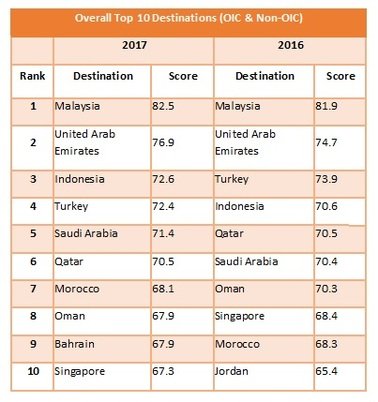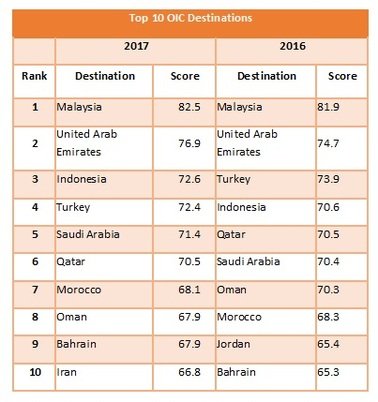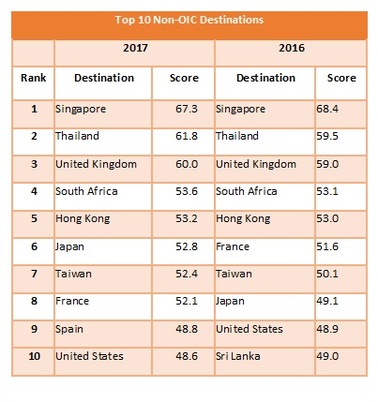Jakarta, 3 May 2017 – Malaysia and Singapore have strengthened their position as the top performing destinations of a sector expected to be worth $220 billion by 2020 according to the most comprehensive research released on the global Muslim travel market.
The Mastercard-CrescentRating Global Muslim Travel Index (GMTI) 2017, which covers 130 destinations, saw Malaysia keep the top spot while Indonesia moved up to third place in the overall rankings.
The Index showed a number of non-Organisation of Islamic Cooperation (OIC) destinations in Asia move up the rankings, a result of the concerted effort to adapt their services to cater to and attract the Muslim travel market.
Singapore retained its pole position for the non-OIC destinations, with Thailand, the UK, South Africa and Hong Kong rounding up the top five. Japan moved up two places to take sixth spot with Spain entering the top 10 for the first time.
The research showed that the Muslim travel market will continue to grow at a fast pace with the sector estimated to grow to US$220 billion in 2020. It is expected to grow a further US$80 billion to reach US$300 billion by 2026.
It was also revealed that in 2016, there were an estimated 121 million Muslim visitor arrivals globally – up from 117 million in 2015 – and this is forecasted to grow to 156 million visitors by 2020 representing 10 percent of the travel segment.
Asia has remained the leading region in the world in terms of attractiveness to Muslim tourists with an average GMTI score of 57.6, with Africa coming in second place at 47.0, followed by Oceania (43.8), Europe (39.9) and the Americas (33.7)
Fazal Bahardeen, CEO of CrescentRating & HalalTrip, said the GMTI continues to reveal detailed insights which will assist destinations in better understanding the shifting needs of the segment.
“We are definitely seeing the influence of a new breed of young travelers, millennials and Gen Z who are combining technology with a real desire to explore the world while still adhering to their faith-based needs,” he said.
“They will be the driving force for the next phase of growth. These younger travelers want greater choice, unique experiences and constant connectivity which can be seen with the growth of other Muslim lifestyle segments such as Halal food and modest fashion which link perfectly with the travel market.
"As Muslim travel continues to diversify, keeping on top of the demographics of the travelers though these insights from the GMTI will be paramount for destination management teams and decision makers who are ultimately sourcing solutions for this market."
Safdar Khan, Division President, Indonesia, Malaysia & Brunei, Mastercard said, “With an overall expenditure of around US$155 billion in 2016, the Muslim travel market remains a strong driver for the continued growth in travel across the world. It’s constantly evolving with major forces such as changing demographics and digitization shaping the way the industry is progressing.
“Technology for example is improving the experiences of Muslim travelers every step of the way from the planning phase to the experience phase and the sharing phase. There is a huge opportunity for service providers to innovate and adapt their offerings to cater to the unique needs of this segment at each of these phases across multiple touch points. At Mastercard, we’re committed to supporting the growth of this segment and are working with our partners to constantly develop new and innovative programs and offerings for Muslim consumers.”
About Mastercard-CrescentRating Global Muslim Travel Index (GMTI)
The GMTI is the most comprehensive research available on one of the fastest growing tourism sectors in the world, which represents 10 percent of the entire travel economy. It helps destinations, travel services, travelers and investors to track the health and growth of this travel segment while benchmarking their individual progress in reaching out to this growing travel segment.
This year, the report also introduces a strategic tool to help destinations and businesses translate GMTI criteria to actionable plans to improve the Muslim-friendliness of a destination. This takes into account both the destination’s macro policies and ways to improve market outreach, build capacity and capability.
All 130 destinations in the GMTI were scored against a backdrop of four key strategic criteria - access, communications, environment and services – which are further divided into 11 sub-sections. These include Muslim arrivals, air connectivity, visa restrictions, suitability as a family holiday destination, ease of communication, the level of services and facilities it provides, accommodation options and marketing initiatives. Each criteria was then weighted to make up the overall index score.



The full report is available here: https://www.crescentrating.com/reports/mastercard-crescentrating-global-muslim-travel-index-gmti-2017.html